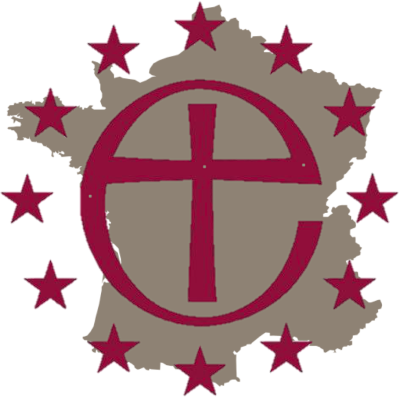This is a summary. If you would like to read the complete minutes, click here.
FRENCH ARCHDEACONRY SYNOD 2016
Chaplains, Lay Representatives, speakers, observers and a team from the Diocesan Office came together under the leadership of Bishop David and Archdeacon of France at a beautiful Abbey in Brittany for the annual Archdeaconry Synod in May 2016.
Migration and refugees was the theme of the synod, and continued firstly in the two excellent Bible study sessions led by the Reverend Dr Richard Briggs, and then in the presentations by speakers directly involved in working with refugees and with partner organisations.
Max McClellan who has been working with the Greater Athens church under a partnership project with the mission agency Us, reported on his experiences on the ground in Greece, where the lack of funding can mean no food, no sanitation, no water, nowhere to wash – and nobody to help.
The church response has not been lacking, and different churches and charities are now working together with the UNHCR. What’s needed is not just funds, but humanity and as Max said so clearly, to call a person an illegal is to will away their humanity.
The Diocese in Europe is working through the charity US, and you can see more on the website http://www.weareus.org.uk/europe/
Doris Peschke, the General Secretary of the Churches’ Commission for Migrants in Europe (http://www.ccme.be) explained more of the logistical and legal difficulties standing in the way of help for migrants and refugees, and what churches are doing by working together with aid agencies and humanitarian organisations. A huge amount of work goes on in the background, of which we are hardly aware.
The CCME study Mapping Migration in Europe attempts to provide information on actual immigration and emigration figures for forty‐four European countries, and seeks to identify the diversity of Christian presence. Read the full publication…
Safeguarding
Refugees are vulnerable – hunger, fear, discrimination, denial of human rights, violence. Vulnerability however is not restricted to refugees and the Diocese has put in place a comprehensive policy and training programmes to protect the vulnerable in our chaplaincies. We heard from the Diocesan Safeguarding Officer, Ian Carter, of the importance and of the difficulties inherent in applying a policy across many national boundaries.
Working with others
It was clear from the various sessions that we can achieve more by working together. The Synod welcomed speakers from the French Protestant Churches in the Lutheran and Reformed traditions about the Reuilly Agreement, and then from the French ARC. The former brings together Protestants and Anglicans and the latter Anglicans and Roman Catholics in France.
Read the report written by the Reuilly group by clicking this link.
There was a lot of food for thought, and the opportunity to share and exchange with those from chaplaincies all over France is not the least important part of the synod. The necessary business sessions were fitted in, and there was time, too, for quiet contemplation in the beautiful gardens of the Abbey. The standing committee, as usual, did an excellent job of organisation and we look forward to next year’s meeting.
For more on the synod, see Bishop David’s excellent blog http://eurobishop.blogspot.co.uk/2016/05/french-synod-focuses-on-migrants-and.html
